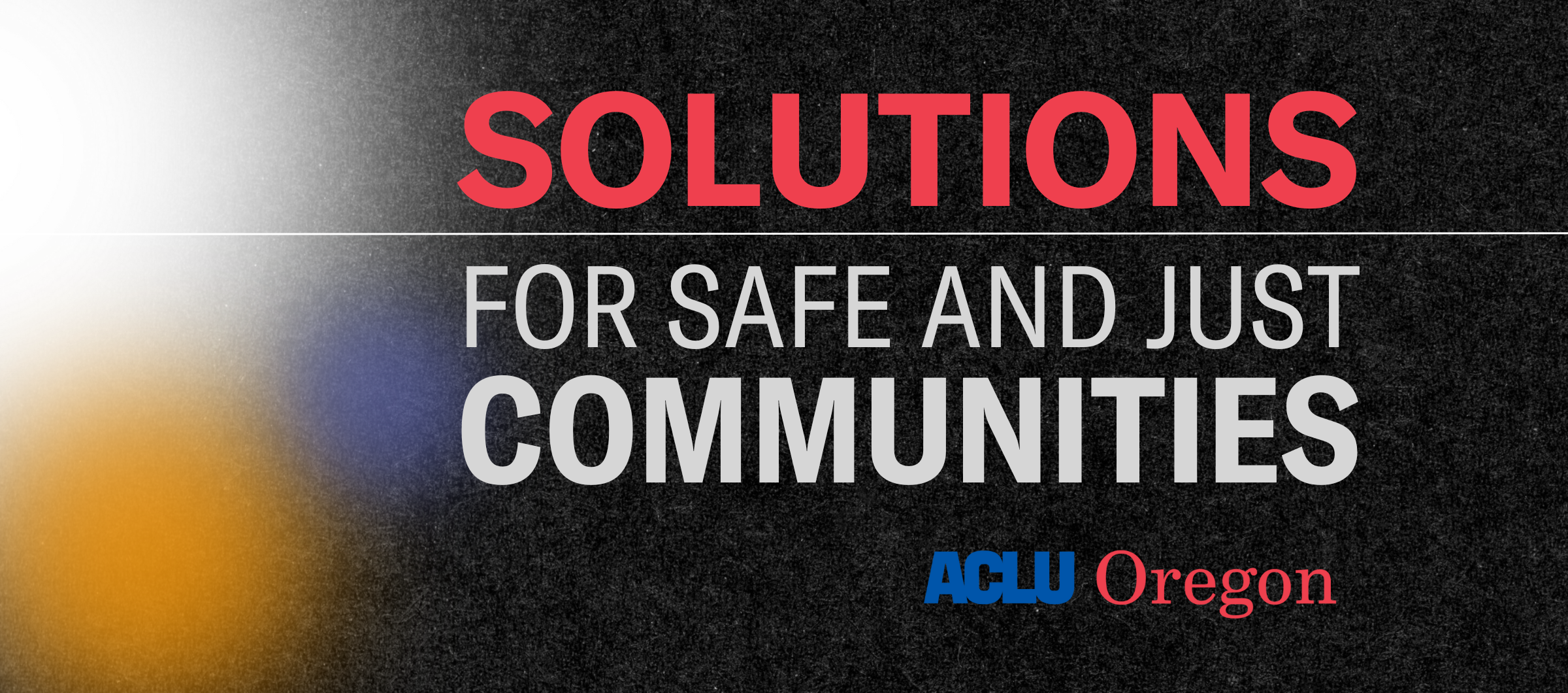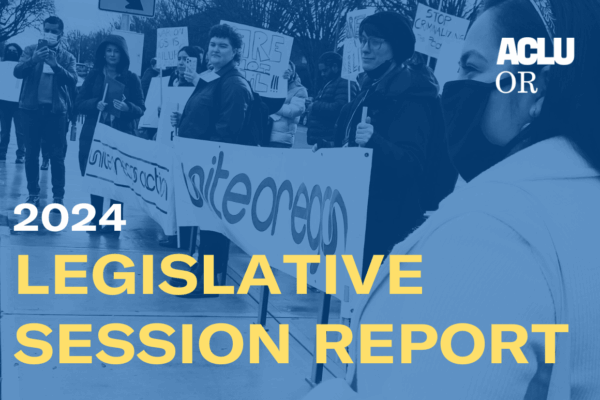

Solutions for Safe and Just Communities
SIGN UP NOW
Stay up-to-date on our issues by signing up for our email list.
By completing this form, I agree to receive occasional emails per the terms of the ACLU’s privacy statement.
Last updated on November 26, 2025
Solutions for Safe and Just Communities
Information about Measure 110 and Solutions for Safe and Just Communities
Oregonians deserve real solutions.
We all have deep frustrations and concerns about the homelessness, drug addiction, and mental health crises in Oregon and across the nation. We must choose real solutions, not scare tactics.
The data is clear: We cannot arrest our way out of homelessness, drug use, or poverty. Access to drug treatment, services, and housing are the solutions we need — not more police, jails, and prisons. Oregonians want effective policies; let’s work together to make this happen.
The ACLU urges lawmakers to support evidence-based solutions that prevent crime by addressing the root causes, like affordable housing, mental health and addiction services, and economic growth.
Oregon voters say no to failed war on drug policies
We can’t expect police to solve every social problem from kids skipping school to mental illness, homelessness and addiction. It's time for solutions that let mental health and drug treatment professionals help people who need and want treatment, freeing up police to focus on violent crime.
Let's be clear. Police and jails won’t solve Oregon’s addiction crisis.
Recriminalizing cannot be a part of the solution and would only have unintended harms to our communities, especially on Black and brown people. Read this piece by the executive directors of the ACLU of Oregon, Imagine Black, and Unite Oregon.
We need everyone to continue contacting lawmakers.
Our voices are needed to counteract the multiple special interest groups who are pressuring our lawmakers to pass bad, harmful criminalization policies:
- One of the interest groups is funded by billionaires and led by the former chief of the Oregon prisons.
- Another is a dark money group founded by a national Republican political operative and oil industry lobbyists; they’re pushing for HB 4036, an extreme Republican-sponsored bill that would jail people with addictions for 364 days, assess them a $6,250 fine, or both.
Oregon voters want these real solutions:
- Increasing addiction treatment with recovery housing
- Increasing affordable housing and reducing poverty
- Creating more safe and accessible shelters and temporary housing options to help homeless people into short-term housing
- Creating work programs for trash clean-up and neighborhood revitalization efforts
- Sending crisis counselors, instead of police, to respond to 911 calls about people having mental health or addiction crises
We all deserve to be safe, regardless of where we live, how we look or who we are. Fifty years of a failed war on drugs showed that jail time for people experiencing addiction only made the problems worse.
Additional Content
Debunking myths and misinformation
A list of common Measure 110 misconceptions and information to address them.
Research shows harsher penalties don't stop drug use
The data is clear that criminalization worsens drug addiction, overdoses, and mental health and creates severe obstacles to housing, education, and jobs.
Drug overdose deaths have increased across the country, not just in Oregon
A research study commissioned by the federal CDC found that increases in overdose rates in OR and WA are not correlated to decriminalization policies. In fact, 33 states have higher rates of drug overdose deaths than Oregon.
Why it feels like drug addiction on the streets is worse than before the pandemic
COVID-19 worsened our homelessness and unsheltered crises. People’s private suffering is in public view, instead of behind closed doors.
Access to mental health services has been a challenge in Oregon for a long time
Mental health was a major challenge for Oregon long before Measure 110, and Oregonians continue to struggle to access insufficient mental health services.
Why it feels like mental illness on the streets is worse than before
COVID-19 worsened our unsheltered crisis. Being unsheltered makes people more vulnerable and reduces safety, which can lead to or intensify mental illness.
Oregon's housing crisis began long before Measure 110
Multiple studies show that homelessness in expensive cities like Portland is caused by unaffordable housing. Data shows that COVID-19 intensified this crisis.
Does Portland have more unsheltered people than other similar cities?
No. San Jose, Raleigh, and Tucson have the highest proportion of unsheltered people. These cities aren’t subject to a decriminalization law like Measure 110.

Research shows harsher penalties don't stop drug use
The data is clear that criminalization worsens drug addiction, overdoses, and mental health and creates severe obstacles to housing, education, and jobs.
Drug overdose deaths have increased across the country, not just in Oregon
A research study commissioned by the federal CDC found that increases in overdose rates in OR and WA are not correlated to decriminalization policies. In fact, 33 states have higher rates of drug overdose deaths than Oregon.
Why it feels like drug addiction on the streets is worse than before the pandemic
COVID-19 worsened our homelessness and unsheltered crises. People’s private suffering is in public view, instead of behind closed doors.
Access to mental health services has been a challenge in Oregon for a long time
Mental health was a major challenge for Oregon long before Measure 110, and Oregonians continue to struggle to access insufficient mental health services.
Why it feels like mental illness on the streets is worse than before
COVID-19 worsened our unsheltered crisis. Being unsheltered makes people more vulnerable and reduces safety, which can lead to or intensify mental illness.
Oregon's housing crisis began long before Measure 110
Multiple studies show that homelessness in expensive cities like Portland is caused by unaffordable housing. Data shows that COVID-19 intensified this crisis.
Does Portland have more unsheltered people than other similar cities?
No. San Jose, Raleigh, and Tucson have the highest proportion of unsheltered people. These cities aren’t subject to a decriminalization law like Measure 110.
For further learning
A list of articles with information about Measure 110.
ESQUIRE, "THE LAND BEYOND THE DRUG WAR"
The Nation, "In Defense of Drug Decriminalization—Yes, in Oregon"
Truthout, "Don’t Blame Drug Decriminalization for What the Housing Crisis Has caused"
NOWTHIS, "Meeting the needs of those experiencing houselessness"
Oregonian, "Police and jails won’t solve Oregon’s addiction crisis"

ESQUIRE, "THE LAND BEYOND THE DRUG WAR"
The Nation, "In Defense of Drug Decriminalization—Yes, in Oregon"
Truthout, "Don’t Blame Drug Decriminalization for What the Housing Crisis Has caused"
NOWTHIS, "Meeting the needs of those experiencing houselessness"
Oregonian, "Police and jails won’t solve Oregon’s addiction crisis"

For Further Reflection
Your ACLU of Oregon team and partners are excited to share this reflection guide with you.


